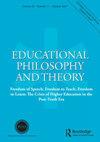Making kin: Exploring new philosophical and pedagogical openings in sustainability education in higher education
IF 1.8
4区 教育学
Q2 EDUCATION & EDUCATIONAL RESEARCH
引用次数: 0
Abstract
Abstract This paper is an exploration of evolving ideas, urgencies, and actions that we have experimented with in our teaching of an environmental sustainability subject with pre-service teachers at an Australian university. It is a work in progress. Through this shared educator-student teaching and learning process we feel the tensions of contradictory forces that disrupt the flow of prior teaching as we all become unsettled by hope and reality, grief, and loss, all mixed in with a sense of urgency and tempered by a set of often unimaginative contemporary pedagogical practices. These tensions often resort educators like us, to perpetuate well-worn and critiqued tropes such as how to ‘care for the planet’ through ‘greening’ practices in schools such as recycling and energy conservation. Always inadequate and limited we are experimenting in our pedagogical repertoire with new ways to teach as we could no longer keep up the charade of agitating for change in the same way. In this paper we explore some of the opening and closures that effect environmental sustainability teaching. We consider how through a reimagining of sustainability education with new pedagogical openings of ‘making kin’ we first attend to these emotional tensions as a means of waking up to who we are in the Anthropocene and then find ways to identify relational ethico-onto-epistemologies in our teaching. By disrupting humanist paradigms and embracing critical posthumanist sensitivities the educators and students nuzzle into new ways of knowing and being in the world.建立亲缘关系:探索高等教育中可持续发展教育的新哲学和教学开放
本文探讨了我们在澳大利亚一所大学的职前教师的环境可持续性学科教学中所尝试的不断发展的思想、紧迫性和行动。这是一项正在进行的工作。在这个师生共同的教学过程中,我们感受到一种矛盾力量的紧张,这种力量扰乱了之前的教学流程,因为我们都被希望和现实、悲伤和失落所困扰,所有这些都混杂在一种紧迫感中,并被一系列通常缺乏想象力的当代教学实践所缓和。这种紧张关系常常让像我们这样的教育工作者来延续那些老生常谈的、饱受批评的说法,比如如何通过回收利用和节能等学校的“绿化”实践来“关爱地球”。总是不足和有限,我们正在试验我们的教学曲目,以新的方式来教学,因为我们不能再继续以同样的方式鼓动变革。本文探讨了影响环境可持续性教学的一些开放和关闭。我们考虑如何通过对可持续教育的重新构想,以新的“建立亲属关系”的教学方式,我们首先关注这些情感紧张,作为一种唤醒我们在人类世中的身份的手段,然后找到在我们的教学中识别相关伦理-个体-认识论的方法。通过颠覆人文主义范式,拥抱批判性的后人文主义敏感性,教育者和学生们摸索出了认识世界和生存世界的新方式。
本文章由计算机程序翻译,如有差异,请以英文原文为准。
求助全文
约1分钟内获得全文
求助全文
来源期刊

Educational Philosophy and Theory
EDUCATION & EDUCATIONAL RESEARCH-
CiteScore
4.20
自引率
15.00%
发文量
171
期刊介绍:
Educational Philosophy and Theory publishes articles concerned with all aspects of educational philosophy. It will also consider manuscripts from other areas of pure or applied educational research. In this latter category the journal has published manuscripts concerned with curriculum theory, educational administration, the politics of education, educational history, educational policy, and higher education. As part of the journal''s commitment to extending the dialogues of educational philosophy to the profession and education''s several disciplines, it encourages the submission of manuscripts from collateral areas of study in education, the arts, and sciences, as well as from professional educators. Nevertheless, manuscripts must be germane to the ongoing conversations and dialogues of educational philosophy.
 求助内容:
求助内容: 应助结果提醒方式:
应助结果提醒方式:


